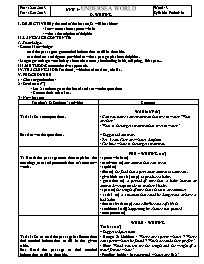Giáo án English 10 - Unit 9: Undersea world - D.Writing - Năm học 2012-2013

I. OBJECTIVES: By the end of the lesson, Ss will be able to:
- know more about sperm whale
- write a description of dolphin
II. LANGUAGE CONTENTS:
1. Knowledge:
- General knowledge:
+ read the passage to get needed information to fill in the table.
+ use the facts and figures provided to write a paragraph about dolphins.
- Language: enlarge vocabulary about characters, size feeding habit, offspring, life span.
III. METHOD: Communicative approach.
IV. TEACHING AIDS: Textbook, whiteboard markers, chalks.
V. PROCEDURES
1 / Class organization:
2 / Oral test: (7’)
- Let 2 students go to the board and answer the questions
- Correct their mistakes.
Bạn đang xem tài liệu "Giáo án English 10 - Unit 9: Undersea world - D.Writing - Năm học 2012-2013", để tải tài liệu gốc về máy bạn click vào nút DOWNLOAD ở trên
Pre : 12.01.2013 Tea: 18.01.2013 UNIT 9: UNDERSEA WORLD D. WRITING Week: 3 Syllable Period: 61 I. OBJECTIVES: By the end of the lesson, Ss will be able to: - know more about sperm whale - write a description of dolphin II. LANGUAGE CONTENTS: 1. Knowledge: - General knowledge: + read the passage to get needed information to fill in the table. + use the facts and figures provided to write a paragraph about dolphins. - Language: enlarge vocabulary about characters, size feeding habit, offspring, life span... III. METHOD: Communicative approach. IV. TEACHING AIDS: Textbook, whiteboard markers, chalks. V. PROCEDURES 1 / Class organization: 2 / Oral test: (7’) - Let 2 students go to the board and answer the questions - Correct their mistakes. 3 / New lesson: Teacher’s & Students’ activities Contents T: Asks Sts some questions. Sts: Answer the questions. WARM UP (6’) - Can you name some mammals that live in water? What are they? - What is the largest mammal that lives in water? * Suggested answer. - Yes, I can. They are whales, dolphins - The blue whale is the largest mammal. T: Reads the passage once then explains the meanings, uses and pronunciation of some new words. PRE – WRITING (10’) - sperm whale (n) - carnivore (n) any animal that eats meat - squid (n) - diet (n) the food that a person or animal usually eats. - give birth (to sb ) (exp) to produce a baby. - gestation (n) a period of time that a baby human or animal develops inside its mother’s body. - span (n) the length of time that sth lasts or continues - at risk (n) a situation that could be dangerous or have a bad habit - due to sb/sth (exp) caused by/because of sb/sth - accidental (adj) happening by chance; not planed - entrapment (n) T: Asks Sts to read the passage in silence then find needed information to fill in the given table. Sts: Read the passage to find needed information to fill in the table. T: Asks some questions if necessary. T: Draws the sample of the given table on the board and then asks Sts to fill in the table with needed information. Sts: Go to the board to fill in the table with needed information. T: Checks the Sts’ answers. WHILE - WRITING Task 1: (10’) * Suggested questions - Range & Habitats: Where are sperm whales?/ Where can sperm whales be found?/ Which ocean do they prefer? - Size: Would you tell me the length and the weight of a male/ female whale? - Feeding habits: In your mind, whales are fish? - Offspring: How long is a gestation period? - Life span: How long/How many years can whales be? - Special features: What are special features of sperm whales? - Conservation concerns: What are some tricks that people play on whales? What should people be concerned about endangered whales? * Suggested answer. SPERM WHALE RANGE & HABITAT All oceans Prefer waters with high squid populations SIZE Male: 18 m in length: 54. 000 kg in weight Female: 12m in length: 17. 000 kg in weight FEEDING HABITS Carnivores; eat mainly squid Eat up to 1.500 kg of food daily OFFSPRING Give birth to one calf every 5-7 years Gestation period: 14 – 19 months LIFE SPAN Up to 60-70 years SPECIAL FEATURES Biggest animals that have teeth on earth Have the largest brain of all mammals CONSERVATION CONCERNS At risk due to hunting and accidental fishing net entrapment T: Asks class write a passage that describes the facts and figures from the table given - Goes around and helps ( if nessecity ) - Corrects POST - WRITING Task 2: (10’) * Sample writing: Dolphins are not fish. They are mammals that live in the water. Dolphins are among the most intelligent animals on Earth. They also can be found in all oceans in the world, dolphins prefer coastal waters and bays. The sizes of dolphins vary greatly. The smallest dolphin is just about 50kg in weight and 1.2 meters in length while the largest one can weigh up to 8,200kg and is 10 meters long. Dolphins are carnivores and they eat mainly fish. A female dolphin gives birth to one calf every two years after a gestation period of eleven to twelve months. A dolphin can normally live from twenty-five to sixty-five years and some species of dolphins can even live longer. Dolphin populations are at risk due to the population of their habitat and accidental entrapment in fishing nets. - Write a short paragraph about one kind of sea animal HOMEWORK (2’) Comments & supplements:
Tài liệu đính kèm:
 D.writing.doc
D.writing.doc





